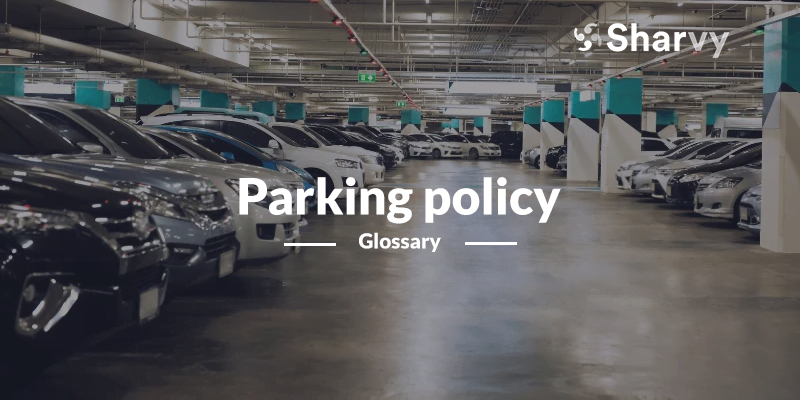What is a parking policy? – Definition
The term “parking policy” is a set of rules that the company adopts to regulate the traffic in its car park. The aim is to optimize car park management by integrating smart parking and associated digital technologies. The objective is to transform the passive management of a company car park into intelligent and active management.
It’s important to note that the problems businesses face are unique to each one, so the parking policy must be explicitly created for each establishment. It also needs to be adapted to the company’s culture, needs, and employees if it is to be implemented to its full potential.
Parking policy : what are the benefits for employees?
Adopting a parking policy can have several benefits for your employees :
- They (re)control how the company car park is used. Implementing a parking policy offers dynamic and fair management of your company car park. Most of the time, this is achieved by implementing a digital parking management solution such as Sharvy. Thanks to this solution, your employees can anticipate their presence on site and foresee whether they will need a parking space. All they have to do is request a parking space via the application. Similarly, if an employee has a parking space and plans to be absent from the office, they will responsibly and autonomously release the space and return it to the “common pot”. The aim is to enable other employees to access the car park and benefit from parking.
- This improves their Quality of Life at Work (QWL). Your company car park is an essential lever for enhancing QWL. A recent study carried out in 2023 by United Heroes highlighted the fact that 22% of employees rank company car parks in the top 3 most important things they can do for their company. That’s why it’s up to employers to offer every employee a positive parking experience. In particular, to limit the stress and considerable time users can spend every morning looking for a parking space.
- A response to their different mobility needs. Implementing a (fair and well thought-out) parking policy not only enables you to respond to the 5 common problems in company car parks. It also allows you to integrate various services into your car park. For example, you can set up a closed, secure shelter for two-wheeled vehicles (bikes, motorbikes) or provide charging points for electric and rechargeable hybrid vehicles. Employees will be more inclined to use soft mobility because the company car park has the necessary infrastructure. These services can be managed via your parking policy and/or via a dedicated digital solution.
What are the benefits of a parking policy for the company and its ecosystem?
For the company and its ecosystem, the benefits are numerous :
- Optimisation of the company car park and its occupancy rate. This is sometimes a non-priority issue and needs to be addressed by companies. However, the costs of a fallow car park are substantial for companies. That’s why good car park management is essential, and it also helps to meet several challenges. These include saving time and money, safety and accessibility, quality of life and working conditions, etc. It is, therefore, essential for companies to take this issue into account.
- Increasing car park profitability. Adopting a well-thought-out and fair parking policy can reduce the number of vacant spaces daily (on average, 30% of spaces still need to be used in a company with no defined policy). If there are still many spaces available and the car park still needs to be completed, the company can choose to rent out some of these spaces, thereby covering part of the car park’s costs.
- Improving your employer brand and CSR policy. By integrating digital technologies into your car park, you can reinvent urban mobility in an inclusive and environmentally-friendly way. At the same time, you are acting on the “social” aspect of your CSR policy since you are positioning yourself as a company that cares about its employees and is helping to improve their comfort and well-being at work.
- Reducing congestion in many cities. Motorists with reserved parking spaces no longer depend on the parking restrictions many towns and cities are beginning to impose (deterrent fines, pedestrian-only streets, LEZs, etc). These are gradually reducing the amount of space given to cars and limiting the available parking. So, by offering access to company car parks to all or some of your employees, they no longer waste time looking for a parking space and therefore no longer contribute to the increase in urban traffic. Decreasing on-street parking spaces can be a smooth process for your employees.
Of course, these lists of benefits are not exhaustive, and you can enjoy many more advantages (specific to your company) once your parking policy has been implemented.
So, if you’re curious about the steps, you must take to successfully create a (fair) parking policy and optimize your company car park… Download our free white paper!

